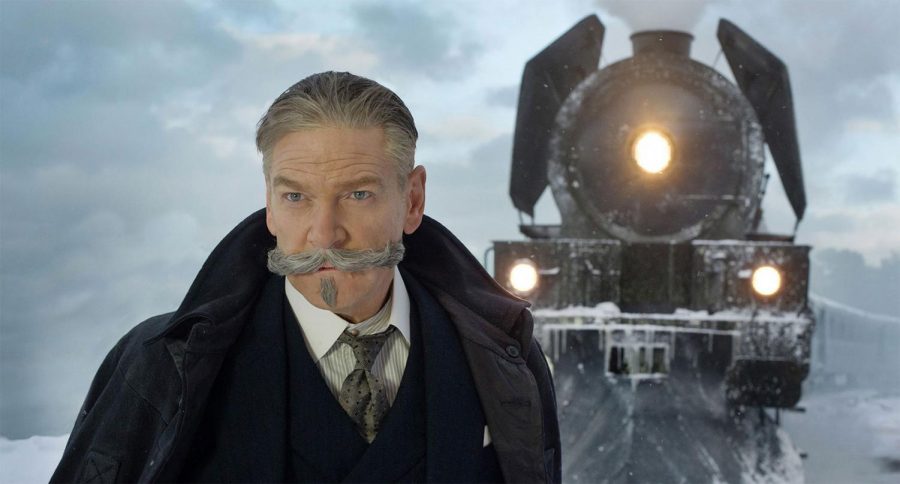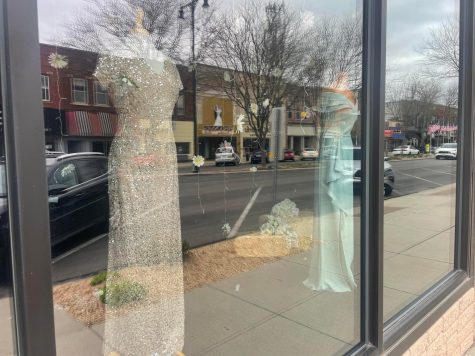‘Orient Express’ is a train in vain
November 14, 2017
Here’s proof that a total train wreck can be boring. “Murder on the Orient Express” breaks apart almost from the first chug chugs as it lugs viewers into its story of death in a luxury railroad car at much less than locomotive speed.
Agatha Christie’s whodunit novels featuring the intelligent, immaculately dressed Belgian detective Hercule Poirot have a formulaic charm entirely absent from this tedious, style-over-substance adaptation. Rather than capturing viewers’ attention with questions about what secrets will be revealed, this will have them curious about when the final credits will roll.
Operating as producer, director and star, Kenneth Branagh moves creatively downscale from Shakespeare to the world’s most popular author. He rules the film as an aged Poirot. Or rather a cartoon version of the great detective, wearing a Guinness World Record pomade-slicked moustache that makes him resemble an imperial version of Looney Tunes’ Yosemite Sam.
Intuitively capable of scanning strangers’ psyches and rapidly finding the guilty and eliminating the innocent, Poirot hopes for a rest from a busy schedule of crime solving. Having unlocked the theft of a religious icon in 1930s Jerusalem before hundreds of adoring fans, he joins departing passengers on the ferry to Istanbul, where they will board the opulent Orient Express for a trip toward London. As the train barrels north through scenery that suggests outtakes from “The Polar Express,” the dining car is soon packed with a largely first-class group of passengers and associated servants, played by a not entirely star-studded selection of talent.
Judi Dench is perfectly on point as the haughty Russian Princess Dragomiroff and Johnny Depp is effectively disagreeable as Edward Ratchett, a shady American wheeler-dealer determined to hire the unwilling Poirot to guard him against an array of enemies. Playing classic Christie red herrings with a twist, Penélope Cruz, Michelle Pfeiffer, Willem Dafoe and Daisy Ridley are good enough, more or less, as a pious missionary, a dipsomaniac gold digger, a Nazi disciple and a governess purer than Mary Poppins. One of the group is soon taking the big sleep in an overnight bunk, stabbed in the chest a dozen times, behind a locked door.
Alert viewers may note that the number of surviving travelers with alibis is also 12, the sort of insight that drains some surprise out of the mystery. Not that the filmmakers expected to stun anyone with the 11th hour surprise that has been common knowledge since the classic book’s appearance in 1934.
Rest assured, the guilty character wasn’t Colonel Mustard in the library with the candlestick. Actually, it could as well have been. Deliberate references to the tabletop board game Clue pop up in a scene checking through the murder’s mounting evidence, and in Branagh’s overhead shots of the restricted sets, which parallel the flattened design of the game’s playing surface.
As the detective pulls together the travelers’ past associations, the relevance of a Charles Lindbergh-style child kidnapping and murder, the story advances at a poky pace, worse than the Balkan avalanche that traps the train for days. There is little in the way of taut suspense and little more to watch than the high production values in the handsome costume design.
Given the massive advertising push for the film and the popularity of Poirot, who appeared in 33 of Christie’s novels, “Orient Express” has a lot of hype to live up to. When a British official tells the great detective at the end that he is needed to examine a case of murder on the Nile, the threat of a sequel is harder to bear than this film’s bloody bed sheets. As Poirot put it himself, “There is right and there is wrong, and there is nothing in between.”
———
‘MURDER ON THE ORIENT EXPRESS’
2 stars
Rating: PG-13 for violence and thematic elements. In English and subtitled French and German.
















